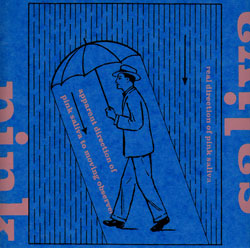
Following John Cage's views on improvisation, playing "what you know, and what you like, and what you feel" is a deterrent to the act of invention; "I mean doing something beyond the control of the ego... What I would like to find is an improvisation that is not descriptive of the performer, but is descriptive of what happens, and which is characterized by an absence of intention". On the subject of "Intuitive Music", Stockhausen concurs: "Musicians must learn to become the opposite of egocentric; otherwise you only play yourself."
But what if your ego is forged from a lifetime of experience spent making and learning from mistakes / successes? Now combine three such egos into a relationship of earned respect and trust whose story is enthralling the first and hundredth (subtly changed) telling. This is how you could become a peer of Pink Saliva.
This veteran Montréal-based trio of Michel F. Côté (drums, microphones, lapsteel), Alexandre St-Onge (electric bass, laptop) and newcomer to the group, trumpeter Ellwood Epps (replacing Gordon Allen), has, individually, established distinguished personalities — all of them generally big, verbose when called for, unique, something you could pick out of a lineup. Together, they form a curious mélange of sacred history lessons and noisy futurism. With the opener, "Amour, Amour, Amour", they introduce a pulsing soundscape (the majority of the disc foregoes the usual frenetic stop / start of free jazz in favor of loose grooves — do not read that as "funk") of tom thumps and a raggedy manipulated shadow of these in the foreground, Ellwood's extended, somber, dying drones, rolling electric bass that evolves via virtual pedals, and lap steel whose shimmering scream fills the distant horizon. The trio often delves into what sounds as the offspring of Throbbing Gristle and Bitches Brew outtakes, particularly during "Debout Les Morts!" when modular squeals and sine waves accompany a symphony of delayed trumpet notes. "54˚ De Céphalorgie" and "Nachtmützen" abstain from driving rhythms to let Côté work his trademark juggling flurry of staccato drum rolls, intricate bash-cymbal-grab-cymbal aggression and feedback bursts; but the most noteworthy moments arrive when St-Onge hinges his instrument to synthetic processing (i.e."Yes, As A Look Springs To Its Face") the results being a microtonal cloud hovering somewhere between Indian raga masters and Jaco Pastorius' grave.
The "self is nothing but a big bag full of stored information", said Stockhausen as a frowning punctuation to the earlier mentioned statement.* Five albums in, and we're still thrilled to rifle though the myriad trinkets in Pink Saliva's duffel.
*I revere Stockhausen and Cage, but I love to see someone escape their checkmate.
Comments and Feedback:



More Recent Reviews, Articles, and Interviews @ The Squid's Ear...


|

